Carbon is essential to our existence. It drives our energy systems both through food production (photosynthesis) and powering of our economy with petroleum-based products. Carbon challenges our environment when emitted to the atmosphere as greenhouse gas compounds (methane and carbon dioxide) or malodor (volatile organic compounds). It impacts water quality and quantity through a changing climate and by via stored carbon in our soils.
Our challenge to a cohort of graduate students from multiple disciplines and institutions is to 1) characterize the carbon cycles within a dairy farm and 2) communicate your dairy carbon model to a lay audience, and 3) explore opportunities for optimizing beneficial carbon products. This cohort challenge uses a dairy farm system to track carbon entering a farm in animal feed, fuel, or animals and exiting a farm in animal products (milk, meat or animals), as carbon emissions (volatile organic compounds, methane, CO2), or manure. Plants synthesize food from CO2 and water, in the presence of sunlight, to produce carbohydrates and O2. Dairy farms are a complex connection of carbon cycles producing both human edible proteins and nutrients from non-edible sources and harmful greenhouse gases and odors. How can you optimize?
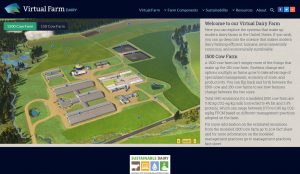
Your cohort’s products will impact the decisions of dairy farmers, policy makers, and food supply chain companies investing in improving the sustainability of dairy systems. Students will integrate your cohort’s products into a nationally acclaimed Virtual Dairy Farm (http://virtualfarm.psu.edu/). Students will interact with a team of land grant university scientists from a USDA Dairy Carbon Coordinated Agricultural Project as they explore the complex systems of a Dairy Carbon Challenge.
Who Is Leading This? This challenge is one of several challenges being planned for piloting during the fall of 2018 as a result of an NSF Funded project, “The INFEWS-ER: A Virtual Resource Center Enabling Graduate Innovations at the Nexus of Food, Energy, and Water Systems”. This project is lead by Luis Rodriguez, faculty member at University of Illinois, and a partnership of faculty from several other land grant universities. Contact Deanne Meyer, Rick Koelsch, Rebecca Larson or Eileen Fabian for additional information.
Dairy Carbon Cohort Course Schedule
Tentative Class Schedule:
The Dairy Cohort Challenge is expected to start October 1, 2018, include a face-to-face experience in March 2019, and conclude by May 1, 2019. Classes are planned for Mondays from 3 AM to 5 PM Eastern. Dates are shown later.
Why?
Today’s academic and business professionals are increasingly asked to address wicked challenges such as those at the nexus of food, energy, and water. Successful professionals will need both the technical and soft skills (interdisciplinary skills) critical to high performing and diverse teams needed for tackling these wicked challenges.
The course will develop young scientists capable of applying “team science” for engaging multiple disciplines in addressing a wicked food/energy/water (FEW) challenges. The cohort challenge will build analytical skills and critical thinking techniques applicable to the interface of dairy cattle and the environment using carbon as the connection to FEW challenges.
Course material will be delivered through synchronous and asynchronous activities. Web meetings will provide synchronous learning. Near the conclusion of the Dairy Carbon cohort challenge, the cohort will assemble for a two to a three-day symposium for additional learning opportunities and finalize the proposed products resulting from this effort. Symposium travel expenses will be paid by the NSF project funding this development of a Transdisciplinary Model for graduated education around Food/Energy/Water challenges.
What are the Learning Outcomes?
Technical (Dairy Carbon) Outcomes
- Students will develop a working knowledge of the complex connection of carbon cycling within a dairy system resulting in both production of human-edible products and transformation of nutrients from non-edible carbon sources, carbon use in soil, as well as carbon losses potentially associated with odors, greenhouse gases and organic compounds emitted to water resources..
- Students will collaboratively map and communicate their dairy carbon model to a lay audience delivered through the Virtual Dairy Farm website developed by scientists involved in the Dairy Coordinated Agricultural Project (http://wpsudev2.vmhost.psu.edu/virtualfarm/explore)
- Students will individually create an educational product (short video, 1-page fact sheet or other product) that delivers fundamental information appropriate for a lay audience on one topic or component of the Dairy Carbon Model.
Interdisciplinary or “Team Science” Outcomes
- Students will gain an understanding of concepts specific to Systems Thinking;
- Students will communicate effectively across disciplines using visual mapping;
- Students will apply principles of “High Performing Teams” in establishing their own interdisciplinary team;
- Students will recognize the importance of engaging stakeholders and consider their perspectives
Final Product?
The cohort will develop a CV ready educational product that will be added to the nationally acclaimed Virtual Dairy Farm (http://virtualfarm.psu.edu/). This virtual dairy farm USDA Dairy Carbon Coordinated Agricultural Project led by a land grant university team. The cohort will be asked to identify gaps in and create an educational product(s) for stakeholders associated with the spectrum from public policy to farmers. Users of this educational product will be able to communicate: 1) important carbon flow pathways in a dairy system, 2) carbon losses from the system and potential impacts on the environment, 3) opportunities to improve management of carbon including potential for energy capture, and 4) opportunities to store carbon in the system to benefit the environment. The student cohort will demonstrate and communicate to others a working knowledge of carbon management in a dairy system.
Who is Leading This? A multi-disciplinary team of land grant university faculty is designing graduate student experiences to help students successfully contribute to team-based approaches for addressing these complex challenges. This team is funded by a National Science Foundation educational grant for developing unique educational opportunities for the next generation of professionals addressing Food/Energy/Water (FEW) challenges. Our project was funded to create “The INFEWS-ER” A Virtual Resource Center Enabling Graduate Innovations at the Nexus of Food, Energy, and Water Systems.
The Dairy Cohort Challenge is one of several practicum experiences for engaging graduate students in experiences to apply both their technical and soft skills for addressing a wicked challenge. Deanne Meyer (University of California – Davis), Eileen Fabian (Penn State University), Becky Larson (University of Wisconsin), and Rick Koelsch (U of Nebraska) are providing leadership for the Dairy Cohort Challenge.
How Much Time Will I Commit as a speaker? We are designing this to be roughly equivalent to a 3 credit hour course for those on a semester system (4.5 credit hours for those on a trimester system). We encourage students to work with their advisor to build this into the student’s academic plans as a 3-credit hour special problems course. A full course syllabus and description are available for documentation requirements.
Tentative Dairy Carbon Course Outline
| Topic | Session | Tentative Date |
| 1 | Getting acquainted and high performing teams – part 1 | October 1, 2018 |
| 2 | High performing teams – part 2 | October 15, 2018 |
| 3 | Overview of Dairy Carbon Cohort | October 22, 2018 |
| 4 | Identify the Relevant Stakeholders | October 29, 2018 |
| 5 | Visual mapping for understanding complex problem | November 5, 2018 |
| 6 | Carbon flows in the dairy production system | November 19, 2018 |
| 7 | Personal Knowledge Management (PKM) networks for connecting with stakeholders | November 26, 2018 |
| 8 | Carbon flows in manure management | December 3, 2018 |
| 9 | Carbon flows in energy use/generation | January 7, 2019 |
| 10 | Identify Stakeholders Interests and Influence | January 21, 2019 |
| 11 | Carbon flows in soil/crops | January 28, 2019 |
| 12 | Using knowledge to develop products for virtual dairy website | February 4, 2019 |
| 13 | Communicating science to a lay audience | February 25, 2019 |
| 14 | Use of modeling to examine and modify the carbon system | March 4, 2019 |
| 15 | “Dollars and sense” of carbon conservation | March 11, 2019 |
| 16 | Educational products for virtual dairy farm continuation of planning from week 12. | March 18, 2019 |
| 17 | Symposium | March 1, 2019 |
| 18 | Continuation of virtual working meetings to finalize virtual dairy working products. (might be one or more meetings) | To Be Determined |
| 19 | Presentation of the final product to Sustainable Dairy CAP project team and representatives of the dairy industry. | To Be Determined |
Calendar verified 8/14/18
| Joseph Burke, Texas A&M University
Education:
Research focus: Root mediated soil nutrient cycling in semiarid row crop production, specifically C and N (Ph.D.); soil health management in semiarid cotton production (MS) and soil analysis instrumentation. |
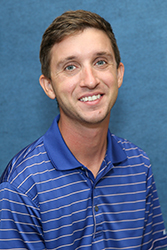 |
| Margaret Carolan, University of Iowa
First-year Ph.D. Student in Sustainable Water Development at the University of Iowa; 3 years of experience in drinking water research and community outreach. Current research is on electrospinning filter materials for water treatment. Undergraduate degree from Virginia Tech in Water Resources with several courses on environmental impacts of agriculture. |
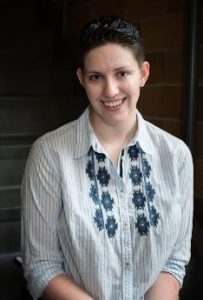 |
| Kirby Krogstad, University of Nebraska-Lincoln
I am currently in an M.S. program in Dairy Nutrition. I did my undergraduate at South Dakota State in Dairy Production. My areas of expertise would be general farm management and dairy nutrition. |
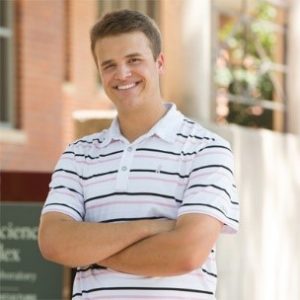 |
| Joslyn Mendez, University of California-Davis
I study dairy nutrition and my thesis focuses on calf intestinal development. I have also worked on projects with methane emissions and nitrogen utilization in beef and dairy cattle. |
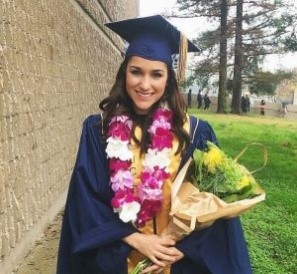 |
| Anna Naranjo, University of California-Davis
As an undergrad, I studied Animal Science at UC Davis, with a minor in quantitative biology and bioinformatics, that has given me experience with animal production systems and quantifying within these systems. As a graduate student, I have been focusing on Life Cycle Assessments to quantify the environmental impacts of livestock production. Specifically, I have been working with pig production and dairy production |
 |
| Breanna Roque, University of California-Davis
Research interests: Development of environmentally sustainable animal production models. Whole systems approach to reduce waste and emissions, while increasing financial stability in animal production and enhancement of nutrient utilization & determination of immunological effects, in dairy cattle, through alternative feeds. |
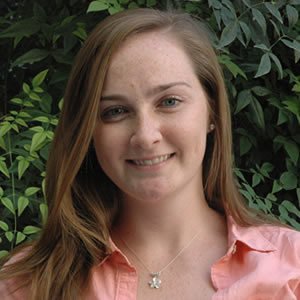 |
| Seyed Mohammad Hossein Tabatabaie
Ph.D. student in Biological and Ecological Engineering. My research focuses on crop modeling, life cycle assessment, food-energy-water nexus, and biofuels. |
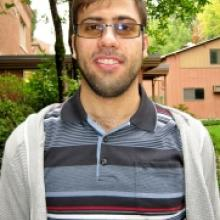 |

